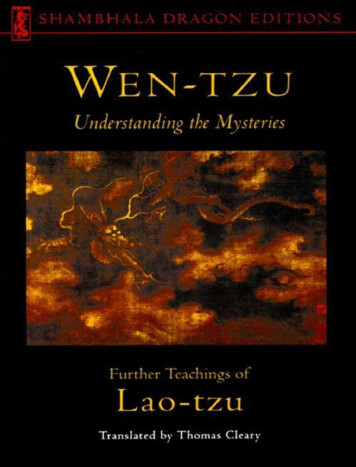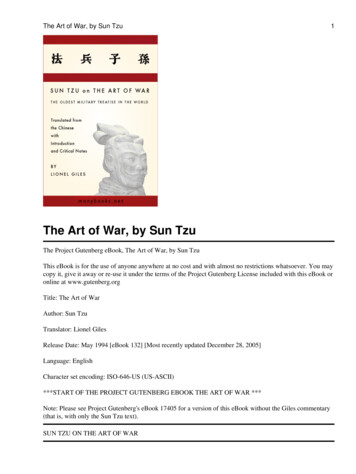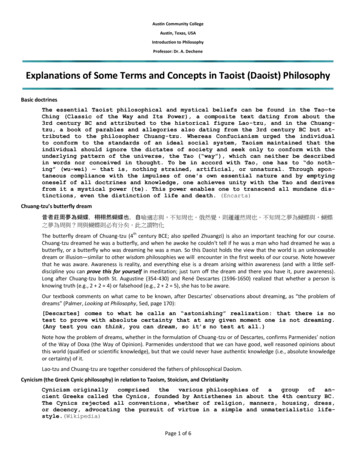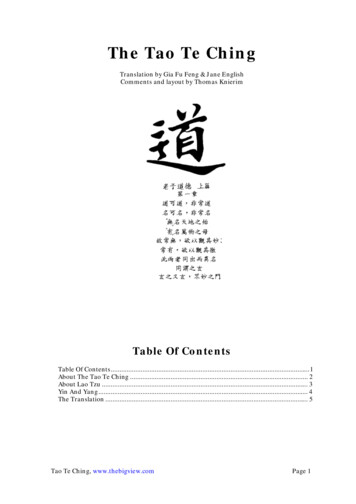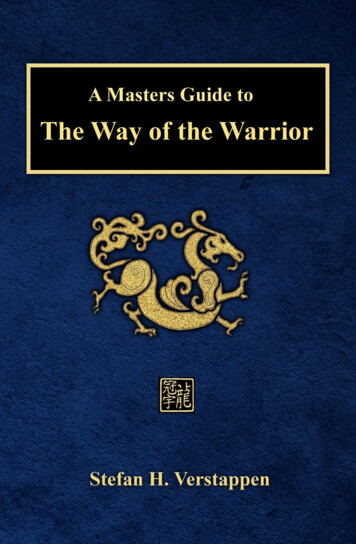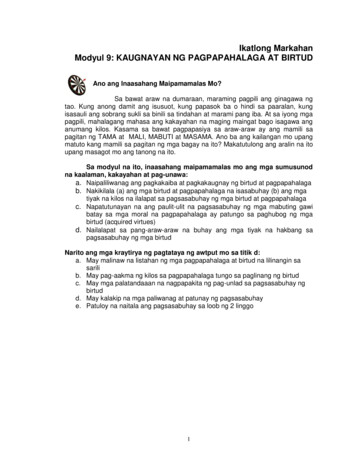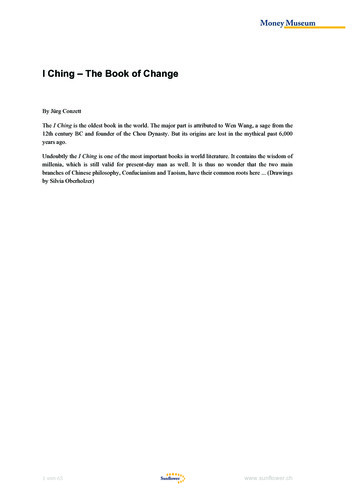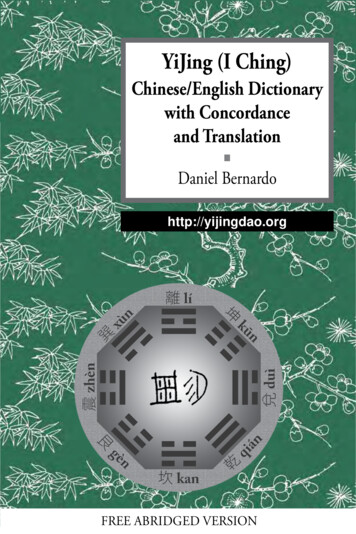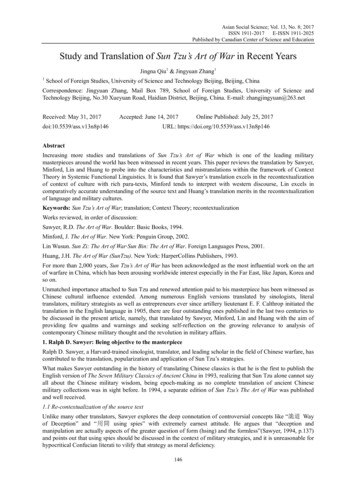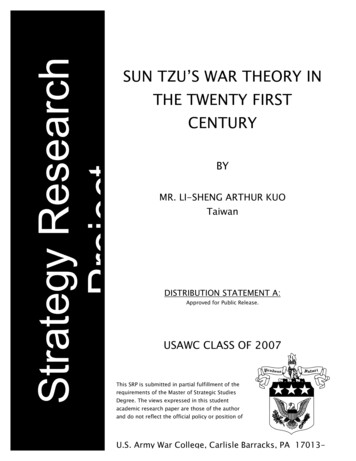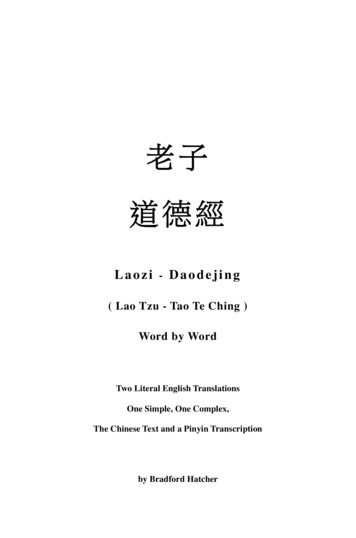
Transcription
Laozi - Daodejing( Lao Tzu - Tao Te Ching )Word by WordTwo Literal English TranslationsOne Simple, One Complex,The Chinese Text and a Pinyin Transcriptionby Bradford Hatcher
Copyright 2009, Bradford Hatcher, All Rights Reserved1st Edition, Published in Nucla, CO: Hermetica.info, 2009Find Current Information at http://www.hermetica.infoDDCS 299.51 . LAO .LCCN BL 1900 L26 E5 .ISBN 978-0-9824191-0-6
Table of ContentsSection A - A Simple TranslationIntroductionA Simple TranslationFootnotes11749Section B - A Matrix Translation and Chinese TextIntroduction and Search TipsA Matrix TranslationCommon Variations in the TextGuodian Index515155195203Section C - GlossaryWordsCharacters Not in the GlossaryCommon WordsPhrases and IdiomsPronouncing Pinyin ChinesePinyin to Wade-Giles Conversion207209235253254256258Section D - Bibliography259-265
IntroductionWith more than a hundred English translations of this little book inprint it has become customary to begin each new version with an apologyexplaining the need for yet another English version. But this one may comeas a surprise to many readers: nobody has yet attempted a rigorously literaltranslation of the Dao De Jing. Nobody has produced a stand-alone Englishversion wherein all of the Chinese words are represented by English counterparts. And nobody has yet attempted a translation which fully resists thetemptation to insert grammatical subjects and genders which do not exist inthe Chinese original.However a number of translators have demonstrated an admirable respect for the original Chinese text and there exist many fine to passable translations, even if not strictly literal. My own favorites are highlighted in bold inthe Bibliography. Further, several versions have provided readers with English equivalents alongside each of the Chinese characters. These too are notedin the bibliography. Unfortunately most do not mention which of the manyvariations in the text are being used or point out places where other versionsdiffer. Typos are usually a problem with these as well.There are several reasons for such a confusion of books. The most obvious is that there exists a large popular market for this book, while most ofthe readers within this market know next to nothing about the Old Chineselanguage. They seem to trust that publishing house editors, or the reviewersquoted on the covers, are more knowledgeable. This is not the case. But thereis a still deeper source of confusion: the original work is not that much betterunderstood in Chinese than in English. Thousands of volumes of interpretation exist in the Chinese language, dating as far back as Wang Bi andHeshang Gong in the third century CE. Interpretations tend to follow schoolsof thought and the cumulative error that this often entails. Often systems ofthought which were in some way derived from Lao Zi are used retroactivelyto interpret the meaning of the source text. The original’s language is terse,ambiguous in places, and full of word play. The Old Chinese language itselfhas no set parts of speech, no tense, gender, voice, mood, plurals, etc. Inmany ways it resembles Tarot cards more than it does conventional language:most words carry a large number of possible translations, in many parts ofspeech, and intended meanings do not become clearer until studied in theirmore limiting contexts. The fact that the original is rhymed is not as important as some scholars seem to think: with only 411 syllables, rhyming in theChinese language is easy. But where the book makes effort to rhyme it oftenmakes the grammar less familiar. Finally, hundreds of older editions exist, andrarely will two be found which agree word for word throughout. Choicesmust often be made between these.As the book began to be translated into languages other than Chinese,a few more interpretive problems entered the picture. The earliest editionswere authored by Christian missionaries. These formed a substratum of schol1
arship upon which most later work was built. But the phrase “full of preconceptions” could almost stand in as a definition of the word “missionary.” Togive credit where due, their minds seemed more open than their less scholarlybrethren. But in their effort to save Lao Zi’s soul they made his words soundalmost as though Jesus might have spoken them, even unto the absurdity oftranslating Dao as God. There were also a number of wrong assumptionsmade about the impossibility of translating Chinese literally, particularly aboutthe need to insert non-existent subjects of non-existent genders. This assumption continues, but I challenge it here.A great mass of speculation, set forth with great cleverness and erudition, has been done on what this little book says and means, often flying rightin the face of the many things that Lao Zi himself had to say on the difficulties that we humans have due to cleverness and erudition. This is delightfully,wickedly perverse. Lao Zi will say something like: “The five colors will makethe human eye blind.” Commentators will then rush to “enlighten” us, withgreat detail, about what the five colors are, presumably so that we can watchout for them.For the above reasons I perceived a need to return to the original text,as best as this can be reconstructed, and plod word by word through this untilit made sense. It is after all the original, and neither a translation nor a commentary, which has survived these two dozen centuries. And, as it turned out,the book was able to speak for, and even introduce itself. In other words Ihave tried to present Laozi’s Dao De Jing as a simple book with lots of complex thoughts, and not as a Daoist text or even a philosophical work. Commentary in this edition will be limited to a few footnotes on some of the moreobscure cultural references and passages where misinterpretation has been themost common. Restraint has been the most difficult where refraining fromexplaining such key Chinese terms as Dao (way, path, truth), De (character,merit, virtue), Po (unworked wood, original nature, simplicity) and Wei (todo, perform, make, become, regard as). For these the reader is referred to theGlossary at the back of the book.Two different kinds of translations are given here. The first is familiar- alinear representation of thoughts in one language given in another. Particularly between these two languages, much is lost in translation. The original isfar too broad in implication to be fully captured by so narrow and specificlanguage as English. English words cannot be made as fat with meaning asChinese, unless they spread out in another direction or dimension. The secondtranslation addresses this problem by offering a multi-dimensional matrixfrom which a practically infinite number of linear translations can be derived.This offers an average of perhaps four to five different English options foreach Chinese word, and often demonstrates choices between different grammatical constructions. This may be so unfamiliar and so confusing to mostreaders that it is best thought of as an intricate set of footnotes, or a demonstration of the thought processes by which the linear translation of each linewas derived. It can still be used to answer specific questions about the turning2
of certain phrases and the (often deliberate) polysemy, ambiguities and doubleentendres in the original.The combined speculation on Lao Zi’s history and the origin of thisbook would fill hundreds of volumes in Chinese and dozens in English. If weset aside all the speculation, this is what we have left: The Dao De Jing (TaoTe Ching) was written in China during either the late Spring and AutumnPeriod or the Warring States Period of the Zhou Dynasty, at some time between 550 and 350 BCE, by one or more persons either named, writing under the pen name of, or who came to be named Lao Zi (Lao Tzu). Twothings often said of Shakespeare apply also to Lao Zi: if the Dao De Jing wasnot written by Lao Zi, it was by someone else of the same name; and if LaoZi did not write the Dao De Jing he most certainly missed the opportunity ofa lifetime. The name “Lao Zi,” which also stood for a few centuries as thebook’s title, could be a real name, meaning Elder Sir, or a pen name meaningthe Old Youngster. Sima Qian (Ssu-Ma Ch’ien, 145-86 BCE), the Han Dynasty historian, offered the most widely accepted - but still speculative - history:Sima Qian shi ji, Lao Zi chuanSima Qian’s historical record, Lao Zi’s storySi-ma Qian yueSima Qian writes:Lao Zi zheLao Zi wasChu, Ku xian, Li xiang, Qu-ren li ren ye.(A) Chu (Province), Ku district, Li county Quren hamlet resident.Xing Li shiSurnamed of the Li gentryMing ErProper name ErZi DanStyled DanZhou shou cang shi zhi shi ye.A Zhou official in charge of historical archives.Kong Zi shi ZhouKong Zi [Confucius] went to ZhouJiang wen li yu Lao-ziIn order to confer with Lao Zi about ceremonyLao Zi yue, zi, suo yan zheLao Zi said, Sir, that of which (you) speak,Qi ren yu gu jie yi xiu yi!These men, along with their bones, are all done with and decayed!Du qi yan zai erOnly their words remain to be heard3
Qie jun zi de qi shi ze jiaNow a nobleman who has his timing then risesBu de qi shi ze feng lei er xingFailing to find his timing then drifts among involvements andwanders aboutWu wen zhi:This I hear:Liang gu shen cang ruo xuThe good merchant is well guarded, (and) seems to be poorJun zi sheng de rong mao ruo yuA nobleman full of character assumes a posture perhaps ofcommonnessQu, zi, zhi jiao qi, duo yu, tai se, yu yin zhiLet go, Sir, of these proud airs, many desires, affected looks andexcessive ambitionsShi jie wu yi yu, zi, zhi shenThis is all of no use, Sir, to lifeWu suo yi gao zi ruo shi er yiThis is what I intend to tell you about, Sir, and it is finishedKong Zi quKong Zi departedWei di zi yue:(And) addressed the disciples, saying:Niao wu zhi qi neng fei(Of) birds, we know they can flyYu wu zhi qi neng you(Of) fish, we know they can swimShou wu zhi qi neng zou(Of) beasts, we know they can runZou zhe ke yi wei wangFor what runs, traps may be madeYou zhe ke yi wei lunFor what swims, nets may be madeFei zhe ke yi wei zengFor what flies, arrows may be madeZhi yu longAs to dragonsWu bu neng zhi qi cheng feng yun er shang tianWe do not know how they ride the wind & clouds and ascendto heavenWu jin mu jian Lao ZiToday my eyes beheld Lao ZiQi you long ye?Is he (not) like the dragon?4
Lao Zi xiu dao deLao Zi cultivated the path (and) meritQi xue yi zi yin, wu ming, wei wuHis teachings concerned self-effacement, namelessness, the businessof doing.Ju Zhou jiu zhiHaving dwelt long in ZhouJian Zhou zhi shuai nai sui qu(He) foresaw the Zhou’s decline and consequently departedZhi guanComing to the frontierGuan ling Yin Xi yue:The customs house officer, Director Xi, said:Zi, jiang yin yi(You) Sir, about to retire,Qiang wei wo zhu shuPlease, set down a document for my sakeYu shi Lao Zi nai zhu shu shang xia pianWith this Lao Zi then wrote a book (in) upper and lower sectionsYan dao de zhi yiDiscussing the meaning of Dao and DeWu qian yu yan er qu(In) five thousand and more words and then departedMo zhi qi suo zhongNobody knows where he ended.Sima Qian continues beyond this with a few more biographical anecdotes, butthese are much prefaced by “some say” and “perhaps,” and these storieshave led to some wild conclusions about Lao Zi’s great longevity. Even theforegoing account makes the questionable claim that the Lao Zi we havecome to know and love as the Chinese Diogenes was a person who would beconsulted on subjects of ceremony, by the fussy Kong Zi no less. Unfortunately most of recorded Chinese history (together with the earliest versions ofthis book) was lost in the Qin dynasty when the tyrant Qin Shihuang burnedmost of the books.5
Lao Zi zhi Dao De Jingin Simple TranslationThe following is an attempt at a succinct and straightforward literaltranslation of a carefully emended Chinese version of the Dao De Jing.The division of the work into two parts (Chapters 1-37 & 38-81) is aconvention which dates back to the Zhou Dynasty, but probably not to theorigin of the text. These are sometimes called the Dao Jing and the De Jingrespectively. The word Jing, which simply means classic, was a Han Dynastyaddition to a small number of revered texts and indicated canonization. Thebook’s eighty-one chapters are numbered and given in the conventional orderhere, even though these divisions came much later. The chapter divisions maybe thought of as little more than reference points. They are not particularlymeaningful in terms of dividing the subject matter into discrete themes. Agiven chapter may as likely contain three subjects as half a subject, and in nological order either. Chapters are further broken down into itemized lines indicating what is called “parsing,” roughly the division of a text into clausesand phrases, not necessarily sentences. For the most part this parsing is not apart of the original text either, but a matter of convenience and convention.However breaks are sometimes indicated in the original by particles indicativeof the completion of a thought, a question, an exclamation or a pause.There were three objectives in this first version:1) To represent each Chinese term with an English counterpart (for theparticles, sometimes a punctuation mark) so that no part of the original ideawas left out of the text. In a few cases a single English word carried themeaning of two or three Chinese words (much more often it would take twoor more English words to render a Chinese one). For example, tian xia, (all)beneath the sky, is sometimes rendered as nature or the world. Negativessuch as bu and wu are often translatable as a prefix or suffix such as un- or–less (but not all words prefixed or suffixed thus in the translation are derivedin this way). Or zhong bu, to the end not, may translate as never. But thissimplification was done sparingly. Double negatives are far too important toLao Zi’s thought processes to render as simple positives. For example, LaoZi might have described the work to be done by human beings as “to stopdoing what does not work.” This is is entirely different from “doing onlywhat works.” Reiteratives are usually simplified by translators into singlewords when they should instead be explored for the added breadth of meaning they offer. One net result of this word for word discipline was to preventme from ignoring the little words and particles when they seemed inconvenient, as most translators and scholars have done. The assumption made herewas that, in a book this short and succinct, every stroke had meaning.2) To add as few words as possible, with no embellishment. Much ofthe meaning of the Chinese text is implied by the position of the words withina phrase, and often this implication includes the part of speech, as well as7
tense, gender, plurality, voice and mood. Possessives and conjunctions areoften merely implied. If, when and where are often assumed, especially wherethere is a then or there in the next clause. I often had the need to make theseimplications explicit by adding words sparingly, in parentheses. An impliedand is rendered either as (and) or &. Occasionally an English expression wasallowed to stand alone as a sentence fragment. No apology is made for this.3) To preserve the original word order, wherever this could be rendered in a way which made sense. But this was not always possible or even desirable. Prepositions, possessives and the word zhe (is, means or one who) areprobably the most often out of English sequence. Alterations of word orderare indicated only in the Part Two Matrix, by up and down arrows ( v).The cost of implementing the above three objectives was surprisinglylight - there is the occasional awkwardness of a fragment or an unfamiliarityin the turn of a phrase. But most of the few idioms used actually translate intoEnglish fairly well. In the end, perhaps dozens of lines which have been poorly understood in both Chinese and English have been cleared up here, not byclever and intricate analysis but by the enforcement of simplicity and thereining in of overcomplicated speculation. But it should still be understoodthat there was a cost. There are a lot of places where I could have departedfrom my objective just a little bit and made the text sound prettier, or morefloral or lyrical. But I couldn’t sacrifice the meaning for that. That has beendone enough already.The choices which have been made here between the various versionsof the text are indicated only in the Part Two Matrix by underlining in thefirst two columns. The alternative Chinese words (and in a few cases parsings)are given at the end of the Matrix. I have generally followed the Wang Biversion of the text, but there are dozens of cases where a preponderance ofthe other versions disagree with Wang Bi while concurring amongst themselves. Particularly in cases where one or both of the Mawangdui texts andthe Guodian fragments stand united in agreement with the Heshang Gong orthe Fu Yi versions, I have felt little discomfort about siding with such a strongmajority.To find a particular chapter quickly, use the chapter number with theFind command. This also works in the Big5 or Traditional Chinese text.8
01bcdefghijklmnoA path fit for travelIs not an unvarying path*[See footnotes at the end of thisA name fit for callingchapter, especially this note]Is not a generic name“Nothing” names the origin of heaven and earth“Being” names the mother of the myriad beingsAnd so, always be dispassionateIn order to see the mysteriesAlways be passionateIn order to see the objectivesThese two mean the same (when) emergingWhile diverging in significanceThe sameness tells of their mysteryMystery leading to greater mystery(Is) the gateway to every mystery02bcdefghijklmnopqrAll under heaven know the beauty of things as beautySo ugliness is already thereAll know the good of things as the goodSo the not-good is already thereAnd so being and nothingness beget each otherDifficult & easy complete each otherLasting & brief contrast each otherHigh & low rely on each otherTone & voice resonate with each otherBefore & after follow each otherThis is how wise ones abide without interfering with the work,Practice without speaking their doctrineA myriad beings emerge here, but without explanationAre produced, but with no claimsAre developed, but with no expectationsWorks are accomplished, but with no dwellingInsofar as there is no dwellingThis means there is no departure9
03bcdefghijklmnoNot exalting worthiesKeeps the people from rivalryNot prizing goods which are hard to obtainKeeps the people from acting like thievesNot displaying the desirableKeeps the people’s hearts from confusionThis is how wise ones approach governmentEmptying the hearts(And) filling the belliesWeakening the ambitions(And) strengthening the bonesAlways keeping the people free of sophistication, free of desiresSo that even the clever ones will not presume to meddle at all(Where) action does not take actionThere nothing is out of order04bcdefghijklThe way (is) an emptiness, and in its useSomehow there is nothing in excessSo deep As if ancestor to the myriad beingsBlunt in its sharpnessResolved in its tanglesShaded in its glareOne with this worldSo deep & clearSeeming as though seeming to existWe do not know whose child this is(But) imagine it divinity’s ancestor05bcdefghijHeaven & earth are not compassionateTreating the myriad beings as straw dogsWise ones are not compassionateRegarding the hundred families as straw dogsThe space between heaven & earthHow this is like bellows & flutes!Empty, yet never exhausted(When) moved then more is producedLots of words adds up to exhaustion,(This is) never as good as holding the center10
06bcdefThe spirit of the valley does not dieIt may be known as the mysterious feminineThe gateway of the mysterious feminineMay be known as the source of heaven and earthEndless, continuous, seeming to existTo practice this is not effort07bcdefghijHeaven is eternal, earth enduresThe reason why heaven & earth can continue and endureis this:That their lives are not their ownIn this way (they) can go on livingThis is why wise ones put themselves lastAnd yet (their) being advancesExclude themselvesAnd yet (their) being persistsIs it not because they have no self-interest?Thus (they) can fulfill their self-interests08bcdefghijklmnThe highest good is like waterWater’s goodness benefits the myriad beingsAnd yet does not striveDwells in places which everyone else regards with contemptAnd in this way is close to the wayIn dwelling the good is placeIn mind the good is depthIn relations the good is compassionIn speech the good is sincerityIn government the good is organizationIn business the good is competenceIn movement the good is timingIt is only when there is no contentionThat there then is no resentment11
09bcdefghijTo maintain but then overdo somethingIs not as good as one’s showing restraintTo rough out but then (over)hone somethingDoes not help hold (the edge) long(When) coins and jade fill the hallNobody can defend this(Being) wealthy & honored and then being proudThe natural consequence is one’s own misfortune(When) the work succeeds a body retiresKeeping to heaven’s path10bcdefghijklmnopq(Are) shaping a soul & embracing unionPossible without separation?(Are) concentrating the breath & attaining responsivenessPossible (as a) newborn child?(Are) cleansing & clearing the mystery’s visionPossible without a stain?(Are) caring for people & ruling a realmPossible without interfering?(Are) opening & closing the gates of heavenPossible playing the woman?(Are) clarifying & simplifying the four directionsPossible without knowledge?Create things & care for themCreate but do not possessAct but do not expectLead but do not ruleThese may be called “mystical powers*”11bThirty spokes converge in one hubThen depending upon what does not existis the vehicle’s usefulnessMold clay in order to produce a vesselThen depending upon what does not existis the vessel’s usefulnessCut out doors and windows in order to make a dwellingThen depending upon what does not existis the dwelling’s usefulnessThus, the existence of something serves to make valueThe lack of something serves to make utilitycdefgh12
12bcdefghijThe five colors will make the human eye blindThe five tones will make the human ear deafThe five flavors will make the human palate jadedRacing for speed and hunting for sportWill make the human heart go madGoods which are hard to obtainWill bring human progress obstructionThis is why wise onesRegard the belly instead of regarding the sightAnd so dismiss That to choose This13bcdefghFavor & disgrace are equally frighteningExaltation and big trouble are the same as oneselfWhy say that favor & disgrace are equally frighteningFavor sets up a downfallTo get it is the same as a warningTo lose it is the same as a warningWhich says that favor & disgrace are equally frighteningWhy say that exaltation and big troubleare the same as oneself?This is the reason that we have big troubles:Assuming that we are selvesAs long as we are not selvesWhat troubles do we have?And so, to respect & regard as oneselfthe workings of the worldIs the same as deserving to inhabit the worldTo love & regard as oneselfthe workings of the worldIs the same as deserving to be steward to the worldijklmnop13
14bcdefghijklmnopqrstuLooking for things not seenDescriptions will tell of “the invisible”Listening for things not heardDescriptions will tell of “the inaudible”Reaching for things not graspedDescriptions will tell of “the intangible”These three do not allow complete investigationAnd so are confused and considered as oneWhat height is not brightWhat depth is not darkAn unbroken continuity does not permit description A return home to non existenceAnd so this is called the form of the formlessThe image of nothingnessIt is called obscure & elusiveWhen it is met its head is not seenWhen it is followed its end is not seenTo grasp the path of the ancientsIs the way to master present existenceThe capacity to comprehend the ancient beginningsMay be called the clue* to the way14
15bcdefghijklmnopqrstuvwxyThe ancient gentlemen who were skilled at practiceWere subtle & mysterious, profound & penetratingA depth not easy to fathomInasmuch as they were not easy to fathomIt is thus an effort to construct their appearanceSo ready As if fording a stream in winterSo vigilant As if wary of (all) four neighborsSo dignified As though they were guestsSo relenting Like ice which is about to meltSo artless As though they were of unworked woodSo expansive As though they were watershedsSo intermingled As though they were turbid streamsWho is able, (as) a turbid stream, to become stilland arrive by degrees at clarity?Who is able, at peace, to become energeticand arrive by degrees at lasting vitality?Whoever preserves this pathNot longing for more than fullnessOnly those not overfullCan then stay obscureand not begin to be finished15
16bcdefghijklmnopqrsAttaining perfect emptinessRemain patient & sincereThe myriad beings arise as oneThrough this we observe the returnOf beings in numberless multitudesEach coming home to its rootReturn to the root means serenityIt may be called a return to a higher orderReturn to higher order speaks of the enduringTo comprehend the enduring speaks of clarityTo not comprehend the enduringIs to recklessly create sufferingTo comprehend the enduring (is) toleranceTolerance becomes justiceJustice becomes sovereigntySovereignty becomes celestialThe celestial becomes the pathThe path is then continuousThe death of self is nothing to fear17bcdefghiGreat leaders’ subordinates know of their existenceThose next in order are loved and praised by themThose next in order are feared by themThose next in order are despised by themIf trust lacks basis hereThere will be no trust hereSo be careful - these are important wordsComplete the task, follow through in the workThe hundred families all will declare“(It was) our natural course!”18bcdefgh(Where) the great path is abandonedThere appear benevolence & righteousness(When) the learned & clever emergeThere appear great hypocrisies(When) the six bonds of kinship are out of balanceThere appear filial piety and parental affection(When) countries & clans are in darkness & turmoilThere appear loyalty & public service16
19bcdefghijCut out sanctimony, repudiate clevernessThe people will profit a hundred times overCut out benevolence, abandon righteousnessThe people return to filial piety & parental affectionCut out artfulness, abandon rewards(Then) robbers and thieves have nothing to gainThese three may help to improve the culturebut (they) are not a foundationSo let there be purpose to build on:Look to the ordinary & embrace original natureDiminish self-interest & have fewer desires20bcdefghijklmnopqrstuvwxyz**Cut out the academics & avoid the anxietiesThe (ready) yes, alongside the (obsequious) yeaWhat is the distance or nearness between them?(Even) the good, next to the bad,What is the difference or likeness between them?(That) that which the others hold in aweWill not permit less than awe What nonsense! There will never be an end to this, ever!Everyone (else) is resplendent & festiveAs if feasting on great sacrificesAs if in springtime & climbing up towersI alone am unmoved here, one yet to give a signLike a newborn infant, one yet to smileSo worn & weary, as one with no home to come home toEveryone (else) takes more than enoughWhile I alone seem forsakenWith only my simpleton’s mind!So muddled & confusedThe common folk are bright & sunnyI alone am in chaos & gloomThe common folk are alert & sharpI alone am torpid & bluntSo placid - in this like the seaSo restless a wind - as if never to stopEveryone else has purposeWhile I alone am wayward, like a rusticI alone am other than the othersStill enjoying mother’s meals17
21bcdefghijklmnopqThe bearing of true characterIs simply to follow a true pathIf the way is regarded as an entityIt is only elusive, only vagueSo vague & so elusive(Yet) at its center there is shapeSo elusive & so vague(Yet) at its center there are beingsSo arcane & so shadowy(Yet) at its center there is seedThis seed is profoundly realAt its center there is truthFrom the present back into antiquityIts meaning does not fadeThrough this is seen a common ancestryHow do we know that the common ancestry’s shape is thus?By This22bcdefghijklmnopqrsThe yielding becomes wholeThe bent becomes straightThe hollow becomes replenishedThe worn becomes renewedThe diminished becomes endowedThe plentiful becomes doubtfulThis is why wise ones embrace unityAdopting nature as modelWithout self-displayAnd thus clearWithout self-righteousnessAnd thus distinguishedWithout self-assertionAnd thus having meritWithout self-glorificationAnd thus enduringIt is only when there is no contendingThat none in the world can contend against themThe ancient ones had reasons to claim“The accommodating becomes whole”Is this (just) empty talk now?(When) wholeness is real then one has come hometu18
23bcdefghijklmnopqrsSparing are the speeches from natureSo the whirling winds do not last the morningThe storming rains do not last all dayWhat is it producing these?Heaven and earth(If) even heaven and earth are unable to persistThen compare this (case) with humanity!And so to attend to affairs of the path:The path means an identity with the pathCharacter means an identity with characterFailure means an identity with failureFor those who identify with the pathThe path, in turn, readily* accepts themFor those who identify with characterCharacter, in turn, readily accepts themFor those who identify with failureFailure, in turn, readily accepts themIf truth has no basis hereThere will be no truth here24bcdefghijThose who stand on tiptoe do not stand (firmly)Those who stretch strides do not make progressThose who display th
set aside all the speculation, this is what we have left: The Dao De Jing (Tao Te Ching) was written in China during either the late Spring and Autumn Period or the Warring States Period of the Zhou Dynasty, at some time be- tween 550 and 350 BCE, by one or more persons either named, writing un-File Size: 1MB
